
On May 31, 2022, ZEHO ECO successfully won the bid for the EPC project of Nansi Lake basin Fengpei canal ecological restoration and improvement project (Qing section), with a bid winning amount of CNY 127 million. This bid is the second time that ZEHO ECO has undertaken the construction of the abundant canal ecological restoration and improvement project after winning the “Qin” section with CNY 150 million in 2021. ZEHO ECO will continue to implement the concept of Nature-based Solutions (NbS) in the construction of this project. With the theme of “sewing growth and two-way moistening the city”, it will deepen the “ecological co protection” of the area around the Weishan Lake, and realize the symbiosis and integration of people, water, scenery and the city by taking water with green.
ZEHO ECO adheres to the harmonious coexistence between human and nature, deeply excavates the cultural and ecological background of the abundant canal area, and strives to integrate them in the project, to realize the vision of “three living beings in harmony and green water weaving chain”. The successful bid winning of the project also shows the strength of ZEHO ECO in the construction of ecological projects and enhances its influence on the Yangtze River Delta.
01 Project Overview
Fengpei canal is in Peixian County, the Nansi Lake Basin and the hometown of Liu Bang. It is one of the nine major streams into Weishan Lake. The water quality of the basin is improved, the natural habitat is coupled, the coastal vitality is embellished, and the regional culture is blended. The ecosystem framework and implementation action sequence of blue, green, gray and red are constructed. Based on ecology, water brings green, to realize the multi-dimensional ecological value and more possibilities of the abundant canal.

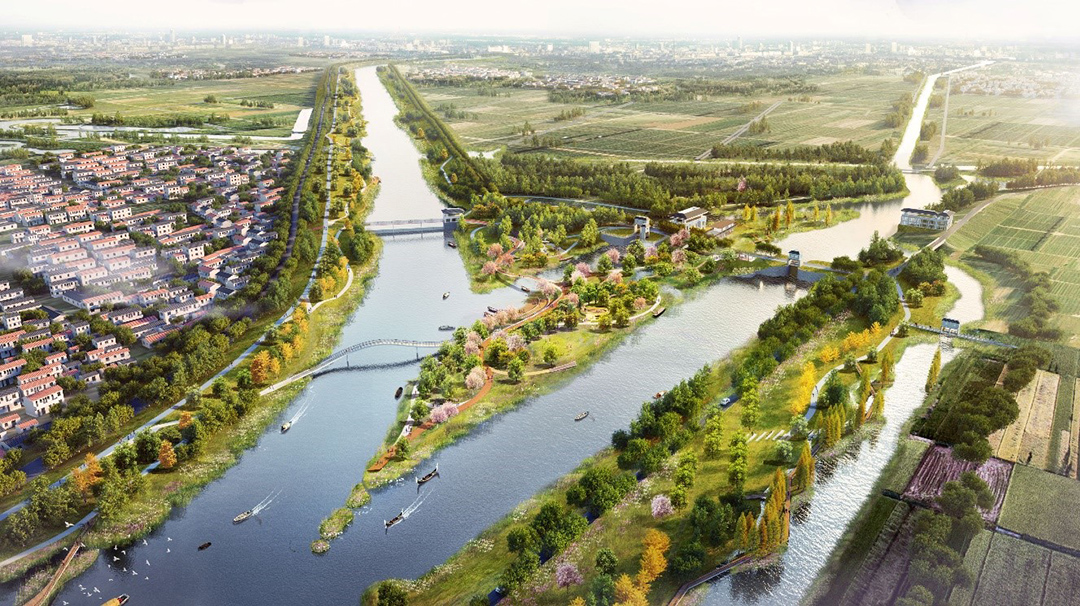
bird view
02 Blue Green System Led by River Style
The technical concept of the Qing section is the same as that of the Qin section in the first phase. Under the spatial pattern of “suture growth and two-way embellishment of the city”, a multi-level three-dimensional ecological corridor of water, bank, beach and embankment on both banks of the river is first built, and gradually extends to the surrounding plots, infiltrates, links and integrates, and builds an overall blue-green vein and ecological space framework.
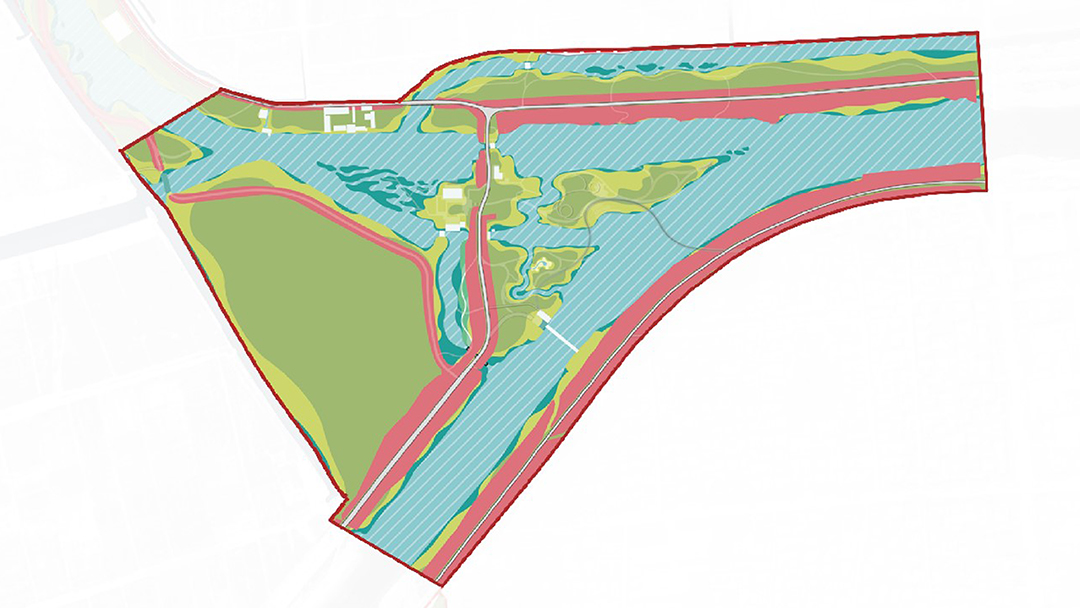
ecological hierarchy of water, bank, beach and dike
From “Qin” to “Qing”, Fengpei canal, Subeidi River, chenlou River, Liuyuan Dagou and other water systems converge here, forming the hydrological form of clear water intersection, which makes it possible to create animal and plant habitats and protect biodiversity; From “Qinyuanchun” to “Qingpingle”, chenlouba, chenlouzha and other rich sluice dam hydraulic facilities on the base are coordinated to display the unique endowment of regional hydraulic culture, and provide an excellent science popularization platform for the clean water ecological interaction experience. The Qingpingle section will become a place where clear water meets vertically and horizontally, an ecological gathering place based on the guidance of ecological restoration, and a cultural interaction experience place where Han culture and ecological water conservancy culture blend.
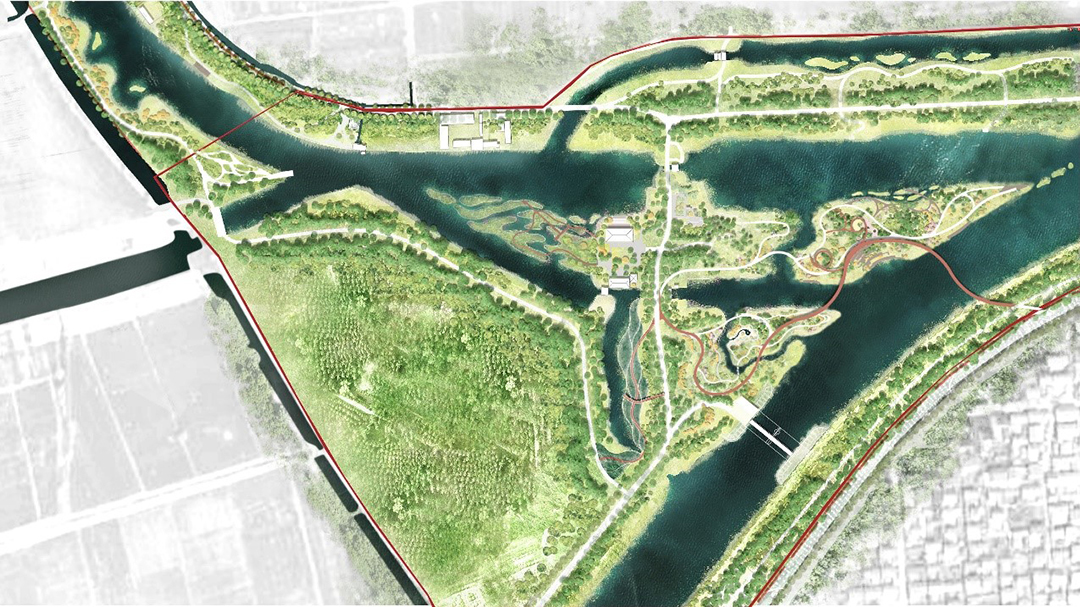
general plan
Biodiversity protection is one of the starting points of the project. The dynamic ecological protection goal is achieved through the coupling of four-dimensional blue-green space. Combined with the water conservancy operation of hydraulic facilities, the flexibility of the ecosystem is shaped, and the diversified ecological categories, habitat communities and ideal habitat for fish and birds are constructed. Respecting the site texture, resource endowment and hydrological characteristics, the core area of the site is divided into two ecological zones: the Hydraulic Park and the Shuize Park, to provide a harmonious and interactive diversity habitat space for people and organisms.


ecological base and functional zoning
Hydraulic Park: follow the guiding ideology of dredging rivers and guiding stagnation, increase watercourses and streams, improve the hydrodynamic force in the region, and enhance the community renewal ability. Set up ecological interactive experience Park and hydraulic Experience Camp in the upper and lower peninsula according to local conditions. Based on ecological restoration, multi-dimensional and three-dimensional ecological interaction science popularization and regional cultural perception will be increased through implementing nine revetment types of ecological construction methods, forest restoration with five canopy densities, new watercourses and purified wetlands.
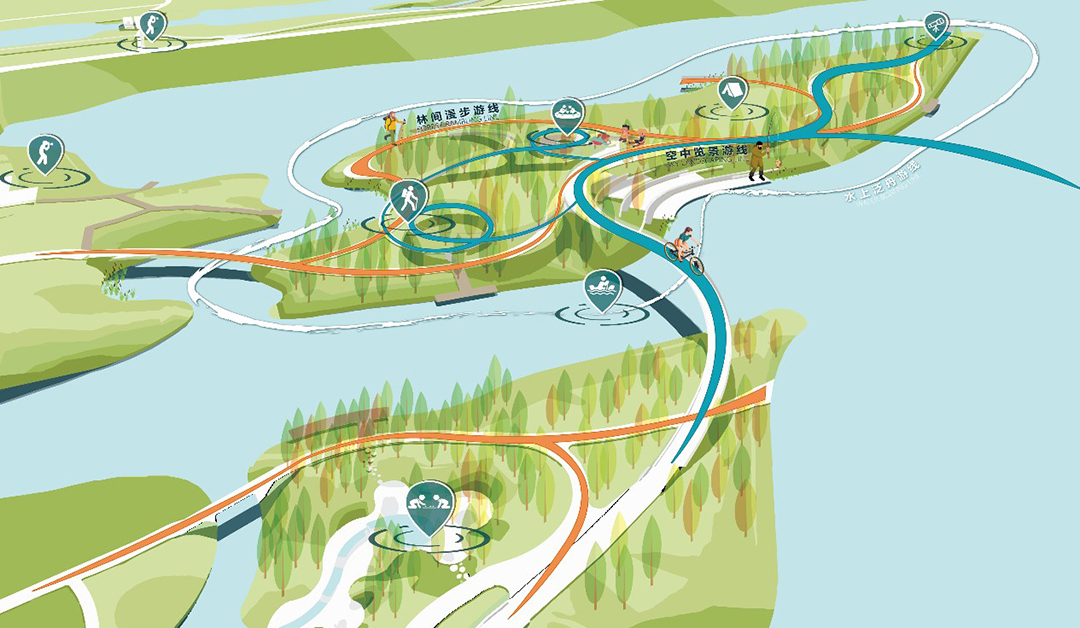
multidimensional three-dimensional ecological interaction
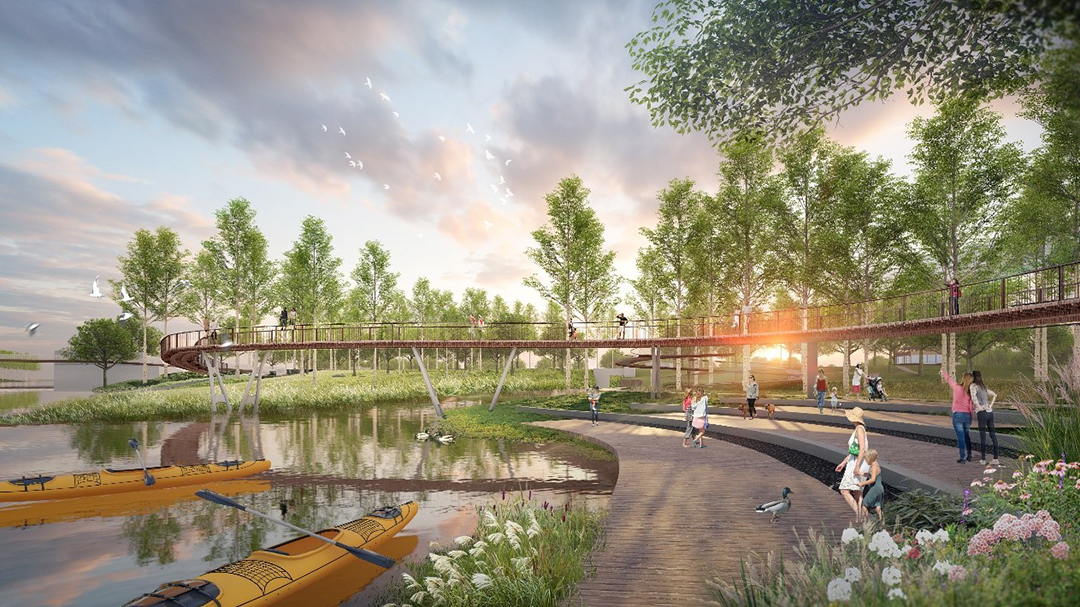
Qingmeng Corridor

It extracts the poetic artistic conception of the representative works of Qingpingle, creates light touch, distributed in a variety of ecological experience spaces, including Guanxi Yingzhou, Yingshui Platform, Shuiyu Bridge, Qingmeng Corridor, Zhushuizhoutou, Flying Canal and Moon, and immerses in blue and green experience and imagination, as well as space-time interaction and dialogue.
A continuous ecological space with stable water quality tells the story of water culture. Unpowered hydraulic experience facilities enable young people to experience the regional water conservancy characteristic culture and understand the value of ecological protection and restoration more profoundly in imitating the operation mode of hydraulic engineering.
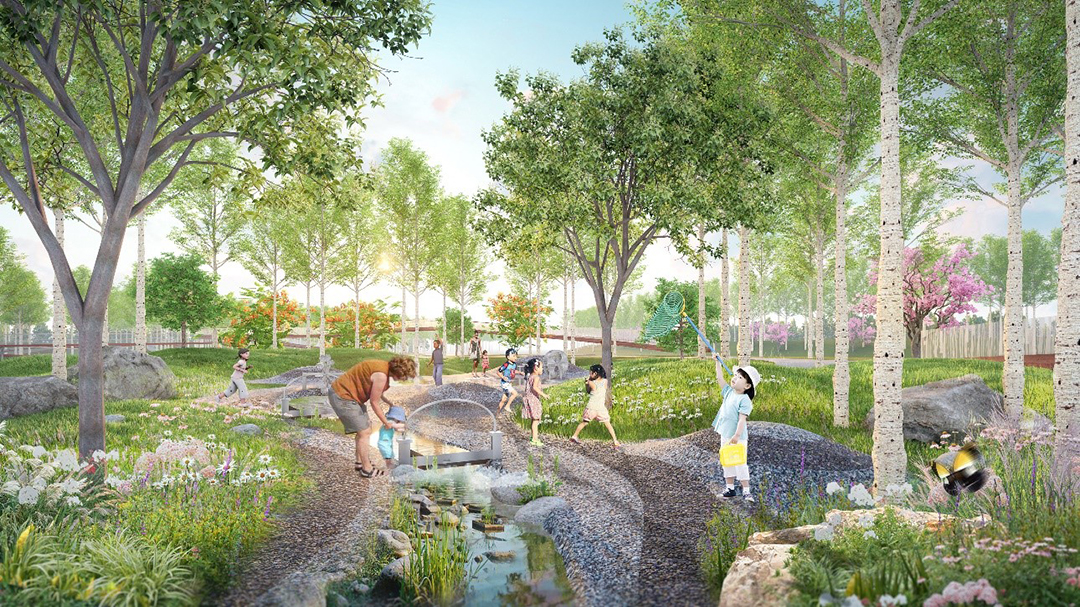

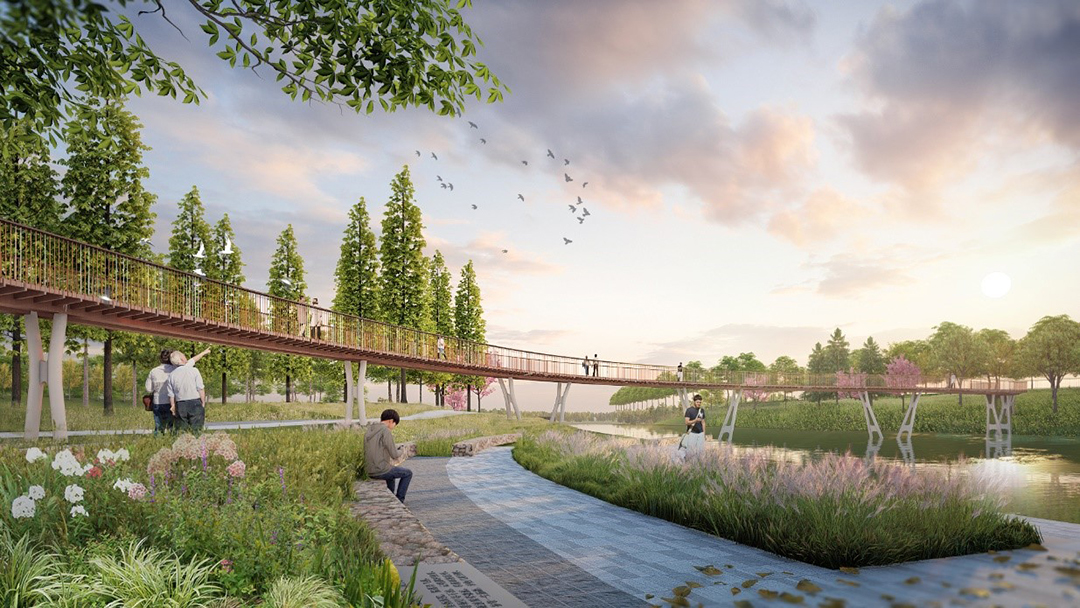
Shuize Garden: in the Shuize Park, based on the Ecological Logic of “suture growth”, we integrate the natural elements of the site and skillfully use the changes of water level to create a multi-category habitat for flowers, birds, fish and insects; The multi-level habitat space and community type were constructed by four-dimensional waterfront ecological buffer zone, waterfront ecological construction method system and aquatic plants with different water depth adaptability; While ensuring the material and energy circulation between land and water and the stability of water quality, it will create a home for all kinds of target organisms to forage, inhabit and grow.
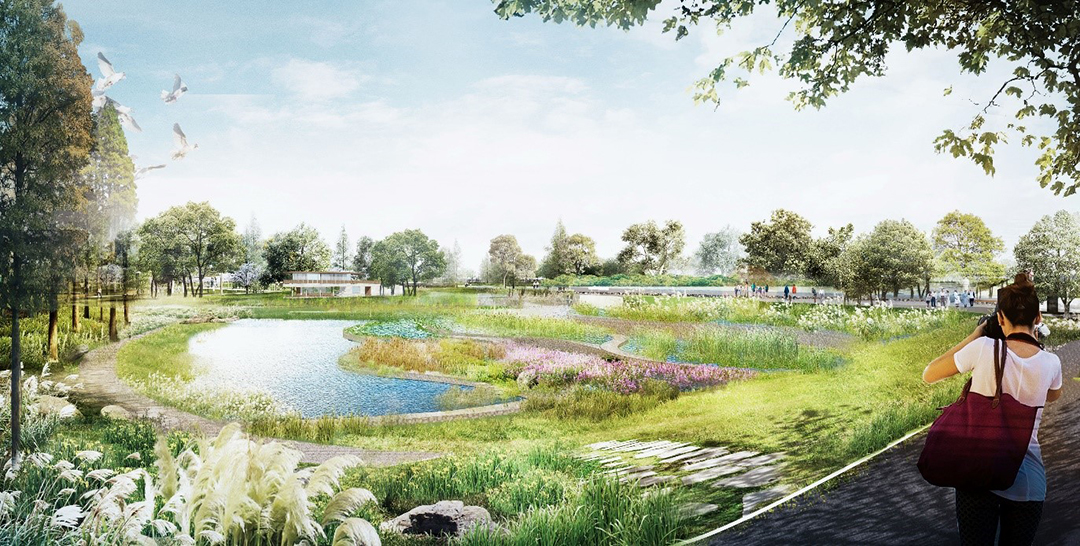

In the “Qingpingle” section, a Nature-based Solutions (NbS) is adopted to achieve ecological restoration, ecological protection and ecological environment quality improvement through the construction of blue, green, gray and red composite three-dimensional space, and the ecological space and ecological elements of the overall river channel are used to build an ecological node section with multiple objectives and functions, such as water quality purification, biological habitat, water conservation and participatory habitat, And then developed into a demonstration sample for the ecological security support of the abundant canal and the protection and restoration of the rivers entering the valley.